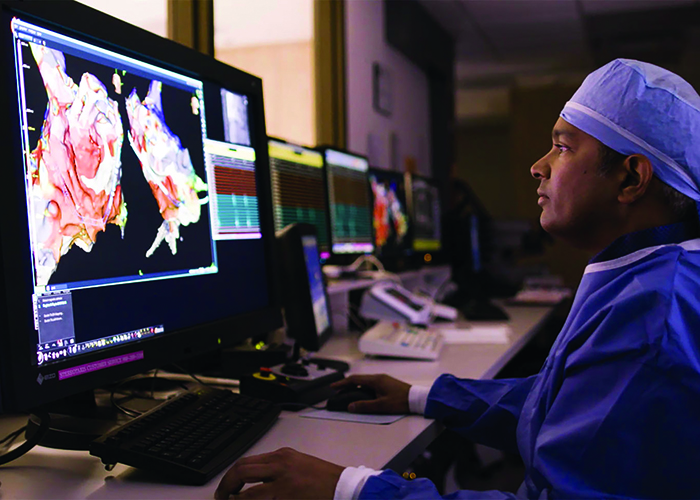Desert Springs Offers New, Radiation-Free Option
June 16, 2021
Desert Springs Hospital now offers non-fluoroscopic catheter ablation to treat atrial fibrillation (AFib), which is an irregular heart rhythm or arrhythmia. This treatment can provide a life-changing option when medications and other interventions don’t work. Benefits for patients can include symptom relief and reduced stroke risk – without the need for radiation.

What Is Ablation?
Ablation is a minimally invasive procedure that uses an advanced mapping system to help doctors locate the origin of an arrhythmia in the heart and break up the signals that are causing the irregular heartbeat. During the procedure, the physician places a catheter into the body through a small incision in the leg and weaves it up to the heart through a vein.
Traditionally, ablation procedures have been performed using a continuous stream of X-rays (called fluoroscopy) to help the physician guide the catheter to the heart. Today, however, Arjun Gururaj, MD, FACC, at Desert Springs Hospital is providing a non-fluoroscopic treatment that instead uses ultrasound guidance and 3D mapping. This eliminates the need for X-rays and radiation, and may also result in shorter procedure times and better efficacy. Ablation is performed by a heart rhythm doctor called an electrophysiologist (EP). It can meaningfully improve quality of life for people suffering with symptoms like heart palpitations, fatigue and others.
As cardiac procedures continue to improve, Desert Springs Hospital is bringing innovative care right here to our community. “We’re committed to being a cardiac care leader in southern Nevada, providing advanced treatments that can help save and improve lives every day,” says Desert Springs Hospital CEO Chris Loftus.
Individual results may vary. There are risks associated with any surgical procedure. Talk with your doctor about these risks to find out if minimally invasive surgery is right for you.
